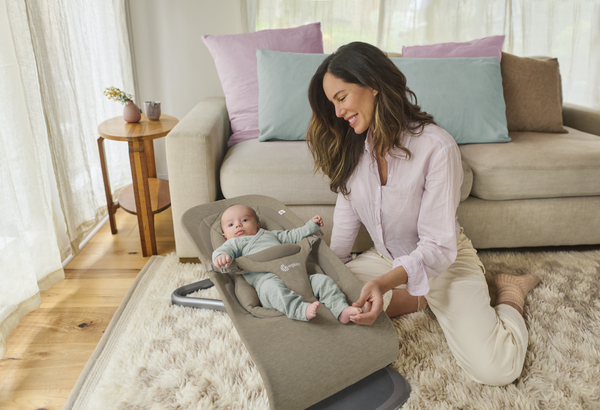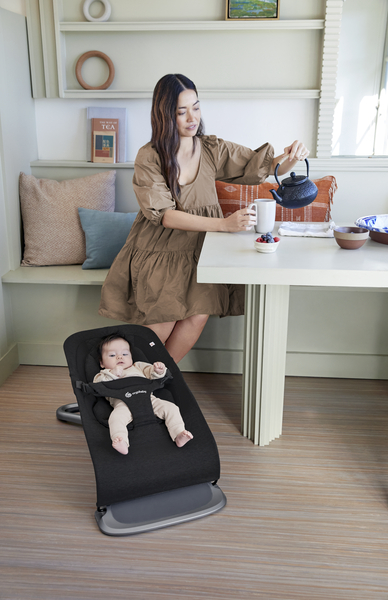
How can you use a bouncer to promote your baby’s development?
Put your baby safely and securely in their bouncer, hop into the shower, done! This is one of the most common functions of this everyday baby essential item. Especially in the beginning, when your baby is small and prefers to be snuggled and close to parents and loved ones.
Did you know that you can use your Ergobaby 3-in-1 Evolve Bouncer to play with your baby and encourage their development?
A baby bouncer can help with developmental milestones in several ways, although it’s important to note that its impact may vary from one child to another. Here are some ways in which a baby bouncer can contribute to a baby’s development:
 Sensory Stimulation:
Sensory Stimulation:
- Visual Stimulation: Many baby bouncers come with attached toys or mobiles that provide visual stimulation. These colorful and moving objects can engage a baby’s visual senses and encourage them to track objects with their eyes, promoting visual development. The Evolve 3-in-1 Bouncer comes with a removeable toy bar featuring age-appropriate toys for simple stimulation and fun (we recommend using this bar starting around 4 months as it can be over stimulating prior to that age).
Motor Skills:
- Leg Strength: When a baby kicks their legs while in a bouncer, it can help strengthen their leg muscles and promote gross motor skill development. This activity can be especially beneficial for babies who are not yet crawling or walking.
- Balance and Coordination: Sitting in a baby bouncer allows babies to practice and develop their balance and coordination as they learn to control their movements while bouncing or swaying.
Cognitive Development:
- Cause and Effect: Babies can learn about cause and effect through their movements in a baby bouncer. When they kick or move, they see and feel the bouncing motion, helping them understand that their actions can have an impact on their environment.
- Spatial Awareness: Being in a baby bouncer provides a different perspective on the world around them. This can help babies develop spatial awareness as they observe objects and people from a slightly elevated position.
Parent-Child Interaction:
- Bonding: A baby bouncer can be a useful tool for parents to interact with their baby. When a parent engages with their baby while they are in the bouncer, it promotes bonding and social development.
It’s important to note that while baby bouncers can have these potential benefits, they should be used in moderation and under supervision. Prolonged or excessive use of baby bouncers may have drawbacks, such as limiting a baby’s opportunities for free movement and exploration, which are also crucial for development. Parents should always prioritize tummy time, floor play, and other age-appropriate activities to support their baby’s development.
Suggestions for Play and Movement

When your baby is born, they can only see 7-10 inches from your face and react mainly to high-contrast objects – mainly black and white. As the weeks and months go by you get more and more opportunities to actively interact with your baby. For example, you can play games and do movement exercises while your little one is sitting in their bouncer. At the same time, the rocking motion has a calming effect on your baby as it is reminiscent of rocking in the womb. Your baby will love it!
A bouncer is not a permanent resting place, but a short-term aid in everyday life. Encourage a healthy mixture of carrying, cuddling, nursing, eating and time on the floor, preferably in the tummy time position as this is very important for your child’s development.
Ready from Day 1
When baby can’t be safe and cozy in your arms, the bouncer is another safe and cozy place for them. The Evolve bouncer gives you the peace of mind you need to support your parenting journey. Our Evolve 3 in 1 bouncer comes with a removable newborn insert, so your baby’s sensitive head is optimally supported from day one.
As babies can turn their head to the side to 45 degrees in the first few months, and only with a slight hyperextension of the cervical spine, the back of the head should always have enough room to turn. Our newborn insert is designed in such a way that your child’s head is not forced into a tilted position, or the chin is pressed onto the chest. Baby can breathe freely, and avoid a flat back of the head, the so-called flat head syndrome.
Try the following ‘games’ as part of your little one’s development:
Eye contact: Use your bouncer to practice eye contact by placing your baby in their bouncer and approaching their face from their feet – about 7 inchesYour baby will begin to return your gaze and enjoy eye contact. Talk or sing to your baby while you do this.
Hand-to-mouth coordination: Encourage your baby’s hand-to-mouth coordination and sucking skills by bringing their hand to their mouth and letting them explore.
Draw a face: Whilst your baby is relaxing in their bouncer, outline your baby’s face using your finger. Draw the outline of their eyebrows, run your fingers over their nose and around their mouth. Your baby will be amazed.
Sensory Play: Take different textures such as a silk cloth, a feather etc and gently stroke your baby’s skin with it.
From 4 to 6 Months
Your baby’s motor skills improve rapidly from around 4 months, meaning they are showing more interest in toys. With our removable Ergobaby Evolve Ocean Wonders toy bar you can make baby’s time in the baby bouncer even more interesting by exploring sensory skills.
The following additional games can bring variety into your child’s daily routine too:
Texture: Encourage your little one to explore different textures and sounds like ringing a bell, shaking a rattle or grabbing a crinkle toy.
Reach out: To strengthen grasping and hand-eye coordination, you can place or hang a rattle or teething ring from the side of their bouncer. If your baby does not yet reach for a toy, you can encourage your baby to do so by stroking the back of their hand with the toy.
Criss-cross: When your baby is sitting in their bouncer, take their hand in yours and stroke the opposite knee. This is a playful way to encourage grasping through the middle of the body.
From 6 Months+
At this stage babies become mobile and react more to their surroundings. Your baby can now perceive more details. They begin to explore materials, pass objects from hand to hand or put them in their mouth to feel and taste them. This is also the right time to baby-proof your home environment if needed.
Exploratory urges: Give your baby wooden animals, a ball with texture or a Montessori ball to play with in their bouncer. They will be able to occupy themselves with these for a while. Since most toys end up in their mouth, make sure that there are no small parts that could come off and that the material of the toy is not dangerous (e.g., the dye colors used). Every toy should be tested for harmful substances and approved for babies.
Show me your feet: Little feet are a great way to interact in the bouncer. Take your baby’s feet in both hands and massage the soles of their feet length and width ways. This helps to develop the arches of the feet. You can also bring the outer edges of your baby’s feet together. They will then look at the soles of their feet like an open book. They may start to play with their feet or clap the soles of their feet. This so-called supination position is important for the correct positioning of the feet in further development.
Discover and look: Use your bouncer as a seat to read books together. A baby bouncer is a great ergonomic chair, especially if your baby is not yet able to sit upright on their own for a longer time.

 Sensory Stimulation:
Sensory Stimulation:

